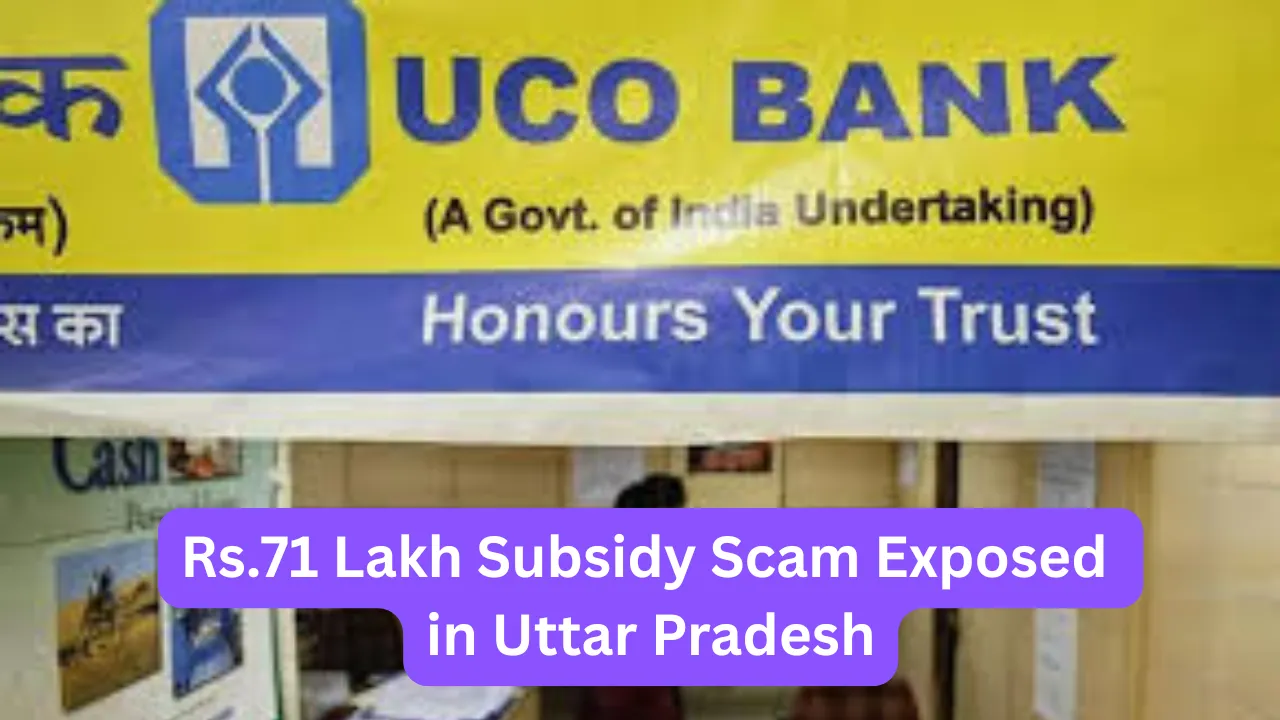Firozabad: A substantial fraud involving a loan subsidy earmarked for youth beneficiaries under the Mukhyamantri Yuva Swarojgar Yojana (MYSY) has come to light in Uttar Pradesh. Officials from the Industries Department and UCO Bank are accused of embezzling ₹71.50 lakh intended for young entrepreneurs. An inquiry has confirmed that the funds were diverted to fake accounts, prompting legal action against those involved.
- Understanding the Mukhyamantri Yuva Swarojgar Yojana (MYSY)
- Mechanics of the Fraud
- Historical Context and Investigation Results
- Impact on the Indian Economy
- Moving Forward: Ensuring Accountability
- Bankerpedia’s Insight 💡
- How Does This Affect the Banking Ecosystem? 🏦
- Research References 📚
- Loved our Research? ❤️
Understanding the Mukhyamantri Yuva Swarojgar Yojana (MYSY)
The Mukhyamantri Yuva Swarojgar Yojana (MYSY) is a pivotal initiative designed to bolster self-employment among young individuals in Uttar Pradesh. Under this scheme, loans of up to ₹25 lakh are sanctioned to youth aspiring to start their own businesses, coupled with a 25% subsidy provided through banks. This financial support serves not only as a lifeline for budding entrepreneurs but also as a catalyst for entrepreneurship in the region.
Unfortunately, reports have surfaced confirming that a substantial portion of the subsidy meant for these beneficiaries never reached them. Following notifications of irregularities, an inquiry was initiated at UCO Bank that uncovered a sophisticated fraud scheme. The District Magistrate (DM) has since mandated an FIR against the branch manager of UCO Bank, in addition to recommending a special audit of related departmental schemes.
Mechanics of the Fraud
During the financial years 2023-24 and 2024-25, loans were approved for 20 beneficiaries through a UCO Bank branch, with subsidies totaling ₹71.50 lakh. However, it was discovered that the funds were illicitly transferred into two fictitious accounts set up under the supervision of the bank’s branch manager. Notably, these fake accounts were formally submitted to the Industries Department as though they were legitimate beneficiary accounts.
- ₹25 lakh was transferred to the account of Saurabh Gupta, covering four beneficiaries.
- ₹46.50 lakh was directed to the account of Deepanshu Tiwari, covering 16 beneficiaries.
The investigation has revealed that the scam persisted for two whole years, implicating not just the bank manager but also a field officer and various officials from the Industries Department. Each financial transaction bore the signatures and approval of these individuals, demonstrating a concerning level of collusion.
Historical Context and Investigation Results
The fraudulent activities spanned across the tenures of two previous Deputy Commissioners of Industries, Dushyant Kumar and Sandhya. Upon receiving a complaint, the DM constituted a committee led by ADM Vishu Raja, which included senior treasury officials and other members. The committee’s investigation corroborated the claims of misallocated subsidies, leading to serious ramifications for those implicated.
In light of the investigation’s findings, an FIR against the UCO Bank branch manager has been filed. Additionally, the situation has been escalated to the state government for further proceedings against all individuals involved. As a precautionary measure, the branch manager has been reassigned to Kanpur while a confidential internal investigation is set to commence within both the Industry Department and the UCO Bank branch.
Impact on the Indian Economy
This incident of fraud not only undermines trust in the banking sector but also jeopardizes efforts to strengthen the Indian economy through youth entrepreneurship. By diverting funds meant for genuine beneficiaries, the fraudsters have deprived aspiring entrepreneurs of crucial startup capital. With India’s youth forming a significant portion of the population, initiatives like MYSY are vital for fostering self-employment and economic development.
For instance, successful beneficiaries who have utilized this scheme successfully have contributed to local economies and job creation, thereby further emphasizing the importance of proper fund allocation. However, with scams like these surfacing, the integrity of such youth-centric initiatives comes into question.
| Beneficiary | Loan Amount (₹) | Subsidy Diverted (₹) |
|---|---|---|
| Saurabh Gupta | 25,00,000 | 25,00,000 |
| Deepanshu Tiwari | 46,50,000 | 46,50,000 |
| Total | 71,50,000 | 71,50,000 |
Moving Forward: Ensuring Accountability
The exposure of this fraud underlines the dire need for stricter oversight and accountability within financial institutions and government programs to safeguard public funds intended for economic empowerment. As investigations proceed, it is hoped that this case serves as a crucial turning point leading to fundamental reforms in the banking sector, ensuring that such incidents are mitigated in the future.
The Indian economy stands on the brink of transformation, particularly with the enthusiastic participation of its youth. Enabling their entrepreneurial ventures must be prioritized to leverage their potential, and accountability must reign supreme to ensure the success of initiatives like MYSY.
Bankerpedia’s Insight 💡
The embezzlement of ₹71.50 lakh under the Mukhyamantri Yuva Swarojgar Yojana is a serious breach of trust that undermines youth entrepreneurship in India. This fraud not only deprives deserving beneficiaries of essential support but also erodes confidence in our banking and finance sectors. With regulatory scrutiny intensifying, it highlights the urgent need for transparency and accountability within institutions. Readers should advocate for better oversight and remain informed about government schemes to ensure that they receive rightful benefits, playing an active role in fostering a healthier financial ecosystem.
How Does This Affect the Banking Ecosystem? 🏦
- Bank Employees → Increased scrutiny and potential job insecurity for Bank Employees.
- Bank Management → Increased scrutiny and potential regulatory changes for banks.
- Bank Customers → Bank customers may face increased scrutiny and delays.
- Investors / Shareholders → Investor confidence may decline due to fraud exposure.
- Regulators (RBI, SEBI, Govt.) → Increased scrutiny on fraud prevention and financial accountability.
- General Public → Loss of trust in government loan subsidy programs.
Research References 📚
Loved our Research? ❤️
Bankerpedia turns financial confusion into clarity!
Subscribe to our YouTube channel for unbiased insights, financial literacy & practical banking wisdom.










